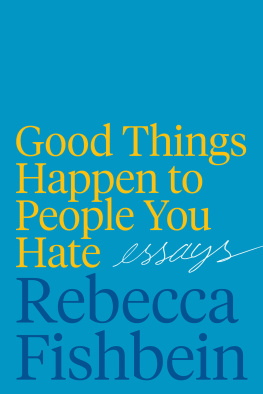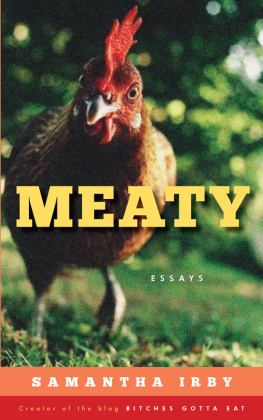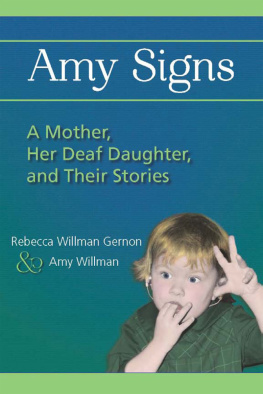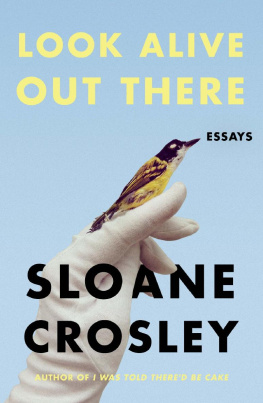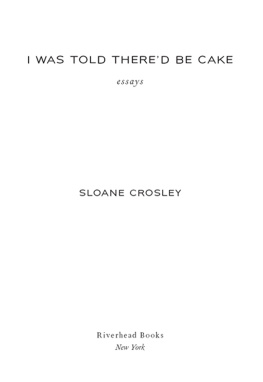Contents
For Nana, who loved books
The worst place to cry in New York is Terminal B at LaGuardia Airport. I can declare this without hesitation because I have cried almost everywhere else in this city. I have cried on every subway line. I have cried (at least four times) for the duration of any route to any apartment Ive lived in. I have cried outside the old Hot & Crusty franchise on Fourteenth Street. I have cried on the Brooklyn Bridge. I have cried at the Foragers grocery store in DUMBO. I have cried on the Brooklyn Bridge while carrying a salad purchased at the Foragers grocery store in DUMBO. I have cried at most bars in my neighborhood and outside my neighborhood, and I once cried so hard at the Meatball Shop they brought me a free ice cream sandwich.
So it is with great confidence that I declare LaGuardias Terminal Bhome to the American Airlines hub, several leaking ceiling tiles, and zero barsthe absolute worst place to drop tears in this godforsaken town. I learned this lesson on November 2, 2017, when I stepped off the bus at LaGuardia, checked my email, and discovered a maniacal billionaire was shutting down the beloved local blog where I worked. To make matters worse, hed replaced the entire website with a stupid letter alerting readers to the sites closure, temporarily rendering the archives inaccessible. My job was gone. Six years of my work was, to my knowledge, erased. Not a single place served alcohol in the entire goddamn terminal. I was in hell.
* * *
I loved my blog job for a lot of reasons, not least of which was that blogging let me write about the news without having to do the scary work of reporting it. I am awed by real journalists who feel comfortable vacating their desks or kitchen tables to go outside and ask people questions. I am afraid of people and I am afraid of rejection, which makes actual reporting my waking nightmare. One of the worst assignments I had as a baby journalist was having to approach fifty people in bars and ask them their favorite New York hookup spots. I was twenty-two at the time, but I looked fifteen, and after three straight days of hounding drunk people all over Manhattan, all I had to show were a lot of rejections, a bunch of fake names, and an angry email from my editor suggesting more thorough reporting in the future.
But blogging, for me, was all fun. Though I did occasionally leave my desk to report on City Council hearings, 7-Eleven grand openings, and other local newsworthy events, for the most part I got to riff on the news from the safety of my office. It was the golden age of internet writing, with the Gawker sites going strong alongside stalwarts like The Awl and The Hairpin, when young writers were encouraged to use and hone their voices. This was sometimes to the detriment of readers looking for real news, since when youre pumping out content at a rapid clip (at my most prolific, I was writing five to six stories a day), you miss facts, make mistakes, and tend to be less informed overall than a reporter who has hours or even days to research a topic. But for those of us who thrilled at coming up with a clever way to describe the intersection of the Cronut line and new iPhone line, this was the Time to Be Alive.
I was as lazy a student as I am an adult. I went to a private high school where everyone tried to murder one another to get into an Ivy, and then I went to a research university where everyone tried to murder one another to get into medical school. I majored in creative writing so Id never have to murder anyone, and I started all my assignments the night before they were due. My junior and senior year, my roommates attentively joined study groups, didnt sneak into bars during finals, cleaned their bathrooms, and graduated Phi Beta Kappa. I was a fuckup who rarely made deans list and once brought home an ex-Marine Id picked up at a Ra Ra Riot concert. We did not understand each other.
At my blog job, though, it didnt matter that I studied too little and wasnt serious enough and tended to come into work hungover. The skills I built over years of pounding out essays last minute actually came in handy when it came to writing blog postsI usually had maybe an hour to make 400 words sing, which wasnt all that different from working under pressure in the library. In the blog world, being a procrastinator was an asset. You had to think on your feet without time to prepare, and you had to love the rush that comes with publishing something decent in less time than it takes to defrost a chicken breast.
As an academic neer-do-well, I longed to find people who were equally good at just scraping by, and once I graduated, I discovered bloggers. Bloggers are great at coming up with quick ways to be mean, just like me. They like to get drunk and complain about how miserable they are, which is my favorite combination of activities. The bloggers I met and sometimes worked with were just as self-deprecating and self-destructive as I was, and after a few years of suffering through long hours, low pay, and carpal tunnel, I started to sense that maybe I wasnt an aberration so much as I fit a different type.
So here I was, desperate to find a place that accepted me for the sluggish human-who-refuses-to-talk-to-other-humans-except-through-a-computer that I am, and I found it in blogging. It took some uncharacteristic persistence for me to find it on a salaried basis (I spent a couple years waiting for the blog to hire me full time, probably because I kept mixing up who and whom and insisted on writing ALL CAPS posts about new zoo animals), but once I wedged my way onto the payroll, I was in.
It didnt take long for my blog job to become my identity. When it came to blogging, I wasnt just allowed to be me, I was required to be, which was a real treat for someone whod spent the majority of her formative years being told the Real Her was too useless to function in the working world. Let your freak blog flag fly, my editor told me, so I did. I wrote about Taylor Swift conspiracy theories and Banksy-themed Bushwick buildings and snakes that live in the toilet. I forced my thoughts about the Boy American Girl doll upon the world. I documented drunk subway rides and rode in a Hasidic holiday caravan and did yoga in a mermaid tail on the beach. I wore crop tops and hiking pants to the office. No one made me do math. I was very happy.
And there was this sense, too, that I was among familythat though my bosses and coworkers didnt share my genetic code, they did share the quirks and failings my real family couldnt quite understand. We were all maybe lazy, definitely funny misfits trying to find a home, and it was a miracle we had stumbled into one. But homes tied to turbulent industries tend to crumble once youve kicked your shoes off, and our comfortable abode was no exception.
* * *
When I entered digital media, I assumed the internets plentiful bounty would spare me the bloodletting I saw at print publications, all of which seemed to suffer bulk layoffs on a weekly basis. The alt-weekly I worked at in Baltimore fired a wave of staff writers and copy editors three months after I started. In the first hour of my first day at my first post-college internship at a big New York City magazine, half the staff was laid off. But the internet, with its vast resources and young writers, felt like the safe place.
Like most twenty-two-year-olds, I was an idiot and wrong about everything. It wasnt long after I hitched my wagon to the blogverse that publishers discovered internet money was a lie. Facebook and Google changed their algorithms and fucked up everybodys numbers. Corporations realized they could run fewer digital ads and make the same number of sales. Hulk Hogan and Peter Thiel sued Gawker into oblivion.
The blog I worked at was independently run, but after all that madness, the owners decided to sell it to Joe Ricketts, a right-wing billionaire, bison superfan, and noted Donald Trump donor. Ricketts owned a hyperlocal news site called DNAinfo, and we, a gang of scrappy underpaid bloggers, were the cheap labor he hoped would ultimately bring down costs at his own site. We were moved out of our lovely little home in DUMBO to a sad midtown office where my crop tops no longer seemed welcome. Our management also had to slash jobs at the site we were joining up with, which made us

